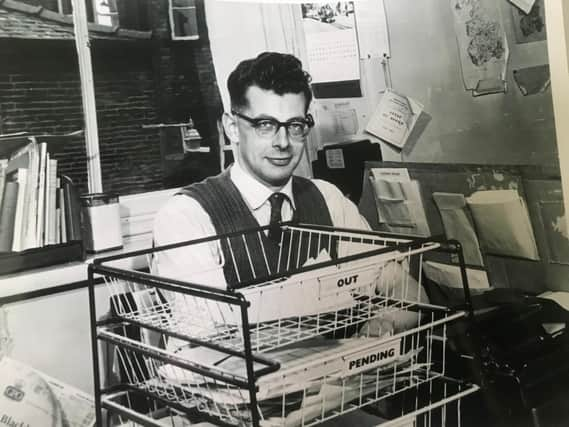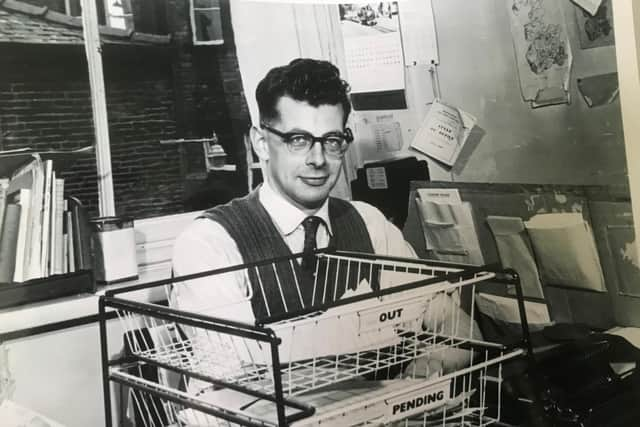Dedicated Pendle journalist Roger Siddall dies aged 82


One of the few remaining links with the newspaper industry of hot metal printing, typewriters and reporters chasing fire engines down the street has been broken with the death of Roger Siddall.
Chief Sub Editor of this newspaper for many years, every story written by every reporter would at some stage pass under his gaze.
Advertisement
Hide AdAdvertisement
Hide AdAnd several generations of reporters, myself included, all owe him a huge vote of thanks as he was their training officer for many years.


He died last week at the age of 82 after a short illness. A private family funeral will take place next week and a celebration of his life will be planned as soon as the current coronavirus restrictions are lifted.
Originally from Radcliffe near Manchester, Roger moved to Padiham as a 10-year-old and successfully passed his 11-plus exam to gain entry to Clitheroe Royal Grammar School.
Having reached the sixth form, Roger decided that he needed to dip his toes into the wider world and, leaving academia behind, successfully applied for the role of junior reporter at the Clitheroe Advertiser and Times.
Advertisement
Hide AdAdvertisement
Hide AdBefore leaving school, Roger had been enrolled into the Literary and Debating Society, something which stood him in good stead for many years to come as he delivered his one and only talk “The World of Weekly Newspapers” to societies and organisations throughout the area. This duty was regarded as work and Roger insisted that any fee which would have been payable should be donated to charity, the company permitting him to accept a small gift such as a box of chocolates for himself.
While at the Clitheroe Advertiser, Roger was called up for two years’ National Service, serving with the RAF. After initial training, he eventually ended up at RAF Medmenham on the banks of the River Thames where he served as a shorthand typist in the Central Typing Pool, a role which became increasingly civilianised leading to Roger being the last RAF to leave.
Returning to the Clitheroe paper in late 1957, he decided it was time to move on and in January 1958 he successfully applied for a reporter’s job at the Nelson Leader, Colne Times and Barnoldswick and Earby Times.Work at the Nelson office was pretty similar to work at Clitheroe, just on a bigger scale.
There were courts and councils to cover as well as general news coverage, features and other special articles.
Advertisement
Hide AdAdvertisement
Hide AdWith a methodical approach, an attention to detail and a built in need to get things right, Roger settled into a life in the office of the paper’s owners – Coulton’s, a family firm of publishers, jobbing printers, bookbinders and stationers.
And it was a life he always found fascinating as the local newspaper world of the time was one of detailed and comprehensive coverage of just about everything which happened in town.
Coulton’s eventually sold up, the Pendle papers joining the same stable as the Burnley Express and all the production side of the business being transferred to the Express building.
At around the same time, the Siddall family was on the move again – this time to Earby.
Advertisement
Hide AdAdvertisement
Hide AdTravelling daily by train from Earby to Nelson gave him a personal insight into the gradual decline and eventual closure in 1970 of the line between Colne and Skipton, a closure which prompted Roger to eventually learn to drive.
By the time he met Betty, his wife of almost 50 years, Roger had swapped the role of reporter for that of sub-editor, eventually acceding to the role of Chief Sub Editor.
At the same time editorial training was changing within the industry. Previously it had been a blend of mentoring from senior colleagues, on-the-job experience and book learning. But a greater importance was placed on training, Roger accepted the additional role of the group’s Editorial Training Officer and he took formal responsibility for the supervising, mentoring and training of scores of young reporters from their initial job interview, through a six month trial period and three years of training before undertaking final examinations. In the several decades he held that role, Roger had few failures in his training role and those few were people destined not to spend significant time in the industry.
Such was the impact he made on his “old boys” and “old girls” that he was delighted and very moved when so many of them attended his retirement party in 1996.
Advertisement
Hide AdAdvertisement
Hide AdDue to the dual responsibilities of training and sub-editing, writing became something of a subordinate role for Roger. But he relished the occasional opportunities for special features, Personal Columns and musical items. For 25 years he covered every opening night of the former St John’s Operatic Society, exceeding the record for continuous coverage set by former editor Noel Wild. During the centenary year of the Nelson Arion Glee Union it was a great privilege for Roger to cover every concert and local recital bar one, when prevented by illness.
He also enjoyed the occasional out of office perk, the most memorable being the trips arranged by British Rail for senior journalists with an intelligent interest in railway matters. He travelled by steam-hauled train from Settle to Carlisle; visited the signalling centre in Crewe; the research establishment at Derby; the Lakeside and Haverthwaite Railway and the Furness and Cumberland Coastal Railway to name just a few.
In the last seven years of his full-time career, regular opportunities to write again presented themselves to Roger. Under the title Mr Pendle’s Diary, he was asked for comment and observation on the week’s topics. Although his name was never particularly confidential, it was only the final “Mr Pendle” in December 1995 which carried his name. A correspondent once described Mr Pendle as “the voice and reason and the conscience of the borough” – a sentiment shared by the majority who read Roger’s thoughts.
Retirement did not stop Roger being active.
With the help of Betty he assumed a number of voluntary positions including that of entries secretary for the Burnley Speech and Drama Festival, patrons’ secretary for Colne Orchestral Society and president of the Colne and District Probus Club, a group of which he was also general secretary.
Advertisement
Hide AdAdvertisement
Hide AdHe served a term on the diaconate at the now-closed Burnley Lane Baptist Church and as a Freemason he was a member and Past Master of the Roses Lodge in Colne; chaplain of the lodge for many years and a member of the Cana Chapter of Royal Arch Freemasons, also based in Colne.
Always fair, always helpful, always approachable, Roger was also known in the office for a remarkable sense of humour which was often played out on the very trainees he worked so hard to help.
He always described Betty as his rock and remained immensely proud of the many achievements of the couple’s son, Andrew, and delighted in the three grandsons he loved dearly.